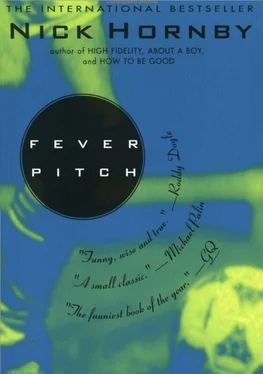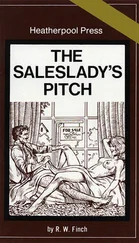I have met women who have loved football, and go to watch a number of games a season, but I have not yet met one who would make that Wednesday night trip to Plymouth. And I have met women who love music, and can tell their Mavis Staples from their Shirley Browns, but I have never met a woman with a huge and ever-expanding and neurotically alphabeticised record collection. They always seem to have lost their records, or to have relied on somebody else in the house—a boyfriend, a brother, a flatmate, usually a male—to have provided the physical details of their interests. Men cannot allow that to happen. (I am aware, sometimes, in my group of Arsenal-supporting friends, of an understated but noticeable jockeying: none of us likes to be told something about the club that we didn’t know—an injury to one of the reserves, say, or an impending alteration to the shirt design, something crucial like that—by any of the others.) I am not saying that the anally retentive woman does not exist, but she is vastly outnumbered by her masculine equivalent; and while there are women with obsessions, they are usually, I think, obsessive about people, or the focus for their obsession changes frequently.
Remembering my late teens at college, when many of the boys were as colourless as tap water, it is tempting to believe that it all starts around that time, that men have had to develop their facility to store facts and records and football programmes to compensate for their lack of distinguishing wrinkles; but that doesn’t explain how it is that one ordinary, bright teenager has already become more interesting than another ordinary, bright teenager, simply by virtue of her sex.
It is perhaps no wonder that my girlfriend wanted to come to Highbury: there wasn’t really very much else of me (she’d listened to my Ramones album), or at least nothing that I had yet discovered and extracted. I did have things that were mine—my friends, my relationships with my mum and my dad and my sister, my music, my love for cinema, my sense of humour—but I couldn’t see that they amounted to very much that was individual, not in the way that her things were individual; but my solitary and intense devotion to Arsenal, and its attendant necessities (my vowel-mangling was by now at a point of almost inoperable crisis) … well, at least it had an edge to it, and gave me a couple of features other than a nose, two eyes and a mouth.
CAMBRIDGE UNITED v EXETER CITY
29.4.78
My arrival in Cambridge provoked the two best seasons in United’s short history. In my first year they won the Fourth Division by a mile; in my second, they found life a bit tougher in the Third, and had to wait until the final week of the season before clinching promotion. They had two games in a week at the Abbey: one on the Tuesday night against Wrexham, the best team in the division, which they won 1-0, and one on the Saturday against Exeter, which they needed to win to be sure of going up.
With twenty minutes to go, Exeter went into the lead, and my girlfriend (who together with her girlfriend and her girlfriend’s boyfriend had wanted to experience at first hand the dizzy glory of promotion) promptly did what I had always presumed women were apt to do at moments of crisis: she fainted. Her girlfriend took her off to see the St John’s Ambulancemen; I, meanwhile, did nothing, apart from pray for an equaliser, which came, followed minutes later by a winner. It was only after the players had popped the last champagne cork at the jubilant crowd that I started to feel bad about my earlier indifference.
I had recently read The Female Eunuch , a book which made a deep and lasting impression on me. And yet how was I supposed to get excited about the oppression of females if they couldn’t be trusted to stay upright during the final minutes of a desperately close promotion campaign? And what was to be done about a male who was more concerned about being a goal down to Exeter City of the Third Division than he was about somebody he loved very much? It all looked hopeless.
Thirteen years later I am still ashamed of my unwillingness, my inability , to help, and the reason I feel ashamed is partly to do with the awareness that I haven’t changed a bit. I don’t want to look after anybody when I’m at a match; I am not capable of looking after anybody at a match. I am writing some nine hours before Arsenal play Benfica in the European Cup, the most important match at Highbury for years, and my partner will be with me: what happens if she keels over? Would I have the decency, the maturity, the common sense, to make sure that she was properly looked after? Or would I shove her limp body to one side, carry on screaming at the linesman, and hope that she is still breathing at the end of ninety minutes, always presuming, of course, that extra time and penalties are not required?
I know that these worries are prompted by the little boy in me, who is allowed to run riot when it comes to football: this little boy feels that women are always going to faint at football matches, that they are weak, that their presence at games will inevitably result in distraction and disaster, even though my present partner has been to Highbury probably forty or fifty times and has shown no signs of fainting whatsoever. (In fact it is I who have come closest to fainting on occasions, when the tension of the last five minutes of a cup-tie constricts my chest and forces all the blood out of my head, if that is biologically possible; and sometimes, when Arsenal score, I see stars, literally—well, little splodges of light, literally—which cannot be a sign of great physical robustness.) But then, that is what football has done to me. It has turned me into someone who would not help if my girlfriend went into labour at an impossible moment (I have often wondered about what would happen if I was due to become a father on an Arsenal Cup Final day); and for the duration of the games I am an eleven-year-old. When I described football as a retardant, I meant it.
Wembley III—the Horror Returns
ARSENAL v IPSWICH
(at Wembley) 6.5.78
It is a truth universally acknowledged that ticket distribution for Cup Finals is a farce: the two clubs involved, as all supporters know, get less than half the tickets, which means that thirty or forty thousand people with no direct interest in the game get the other half. The Football Association’s rationale is that the Cup Final is for everybody involved with football, not just the fans, and it’s not a bad one: it is, I think, quite reasonable to invite referees and linesmen and amateur players and local league secretaries to the biggest day in football’s year. There is more than one way to watch a game, after all, and on this sort of occasion enthusiastic neutrals have their place.
The only flaw in the system is that these enthusiastic neutrals, these unimpeachable servants of the game, invariably decide that their endeavours are best recompensed not by a trip to London to see the big game, but by a phone call to their local tout: a good 90 per cent of them just flog the tickets they are given, and these tickets eventually end up in the hands of the fans who were denied them in the first place. It is a ludicrous process, a typically scandalous slice of Football Association idiocy: everybody knows what is going to happen, and nobody does anything about it.
Dad got me a ticket for the Ipswich final via work contacts, but there were others available, even at university, because the Blues are customarily sent half a dozen. (The following year, when Arsenal were again in the Final, I ended up with two tickets. One was from my next-door-neighbour, who had associations with a very big club in the north-west of England, a club that has been in trouble before with the FA for its cavalier distribution of Cup Final tickets: he simply wrote to them and asked for one, and they sent it to him.) There were, no doubt, many more deserving recipients of a seat than I, people who had spent the season travelling the length of the country watching Arsenal rather than messing around at college, but I was a genuine fan of one of the Cup Final teams, at least, and as such more entitled than many who were there.
Читать дальше











